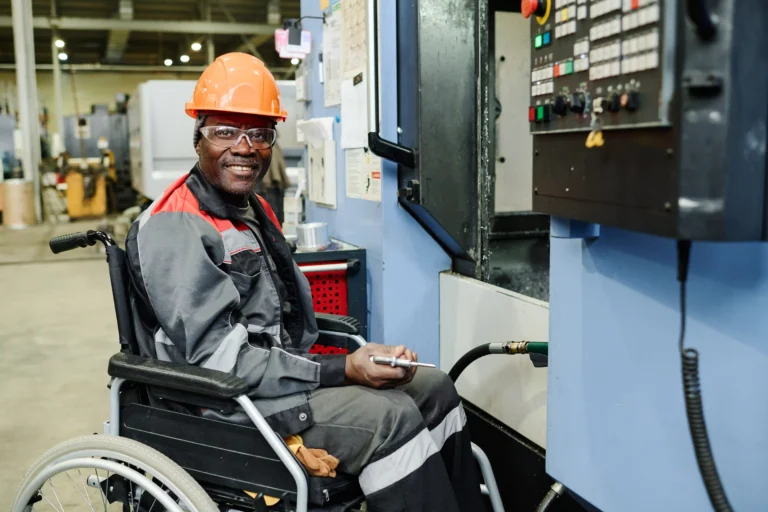Blue Collar Worker Disability Lawyer
Home » Disability Benefits » Blue Collar Worker Disability Lawyer
You’ve spent years doing the hard work that keeps America running. With heavy lifting, repetitive movements, long shifts, and hazardous conditions, blue-collar work is demanding and can take a long-lasting toll on your health.
If an injury, illness, or chronic condition makes it impossible for you to keep working, you may be entitled to disability benefits.
On this Page
- Why Choose National Disability Alliance as Your Trusted Blue-Collar SSDI Lawyer
- Blue Collar Jobs That May Qualify for SSDI Benefits
- Common Disabilities Among Blue-Collar Workers
- How SSDI Benefits Work for Blue-Collar Workers
- The Worn-Out Worker Rule
- Let Us Help You Secure the Benefits You’ve Earned Through Years of Hard Work
Why Choose National Disability Alliance as Your Trusted Blue-Collar SSDI Lawyer
National Disability Alliance helps adults with disabilities secure the Social Security benefits they’ve earned. No matter where you live, we can stand with you. We focus exclusively on Social Security disability, and our team brings insider expertise to blue-collar disability claims for those who have worked in construction, manufacturing, warehouse, trucking, mining, steel, and service jobs.
We know the process can feel overwhelming when you’re hurting and can no longer work. Don’t go through the process alone. We’ll guide you step-by-step, explaining everything and keeping you informed at every turn. We serve clients nationwide in English and Spanish, and you never have to pay out of pocket. That’s the promise behind our commitment—you get SSA experience on your side, optimizing efficiency, service, and outcome.
Jerry B.
“I had an excellent experience with National Disability Alliance LLC. From the very beginning, their team was compassionate, patient, and committed to guiding me through every step of the process. They explained everything clearly, answered all my questions, and made sure I understood my options.
Read MoreLess
“What stood out the most was how much they genuinely cared about my situation—not just as a case, but as a person. Their professionalism and dedication gave me confidence and peace of mind during a stressful time. I’m truly grateful for their help and highly recommend them to anyone seeking reliable support with disability matters.”
Blue Collar Jobs That May Qualify for SSDI Benefits
If physical work has taken a toll on your body or mind, you’re not alone. Many blue-collar roles involve heavy lifting, repetitive motions, hazardous environments, and long shifts that can lead to serious, lasting health problems. When those conditions make it impossible to keep working, Social Security Disability Insurance, or SSDI, benefits may be available.
The following types of blue-collar workers frequently suffer from a disabling condition that entitles them to SSDI benefits:
- Construction workers: Heavy lifting and repetitive strain, combined with fall and equipment hazards, can lead to serious back, neck, and shoulder injuries.
- Truck drivers: Long hours and constant vibration contribute to chronic back pain, while crashes can cause additional trauma. Sleep disorders are common and can reduce alertness and compromise safety.
- Factory and warehouse workers: Repetitive tasks frequently injure the shoulders, knees, and back, while fumes and poor ventilation also increase the risk of respiratory illness.
- Electricians and plumbers: Years of kneeling, crawling, and overhead work can damage joints, and falls from ladders are a persistent danger. Many also face exposure to hazardous environments.
- Mining and oil workers: Dust and chemical exposure can cause lung disease, and heavy, awkward tasks lead to chronic musculoskeletal disorders. Constant industrial noise places workers at high risk for permanent hearing loss.
- Steel workers: Lifting, bending, and overhead tasks often result in musculoskeletal injuries, and heavy machinery increases the risk of burns, falls, and crush injuries. Long-term exposure to smoke, fumes, and dust can damage the lungs, and loud environments often lead to hearing loss.
- Service industry workers: Slips and falls on wet or uneven surfaces are common. Meanwhile, repetitive tasks and pushing heavy carts create chronic strain. Over time, these demands can lead to arthritis and joint degeneration.in
Common Disabilities Among Blue-Collar Workers
Different types of disabilities often arise from physically demanding work. For each, SSA may approve benefits if medical evidence shows your condition prevents you from sustaining full-time work.
- Musculoskeletal disorders: Back injuries, arthritis, and degenerative disc disease can cause chronic pain, limited range of motion, numbness, or weakness. This can make carrying, lifting, climbing, or standing unsafe or impossible. Strong imaging, treatment records, and functional limits can support SSDI when you can’t meet the physical demands of your job.
- Respiratory conditions: COPD, chronic asthma, and lung disease from dust or chemical exposure can cause shortness of breath and reduced lung function, making walking, climbing, or working around fumes, dust, and extreme temperatures difficult. Pulmonary tests, specialist notes, and documented flare-ups can show that you cannot safely perform sustained activity.
- Cardiovascular issues: Heart disease and high blood pressure complications can cause fatigue, chest pain, reduced exercise tolerance, or dangerous blood-pressure swings, restricting exertion. Cardiology records, stress tests, and hospitalizations can demonstrate that full-time, dependable work isn’t feasible.
- Neurological disorders: Traumatic brain injury, stroke, and seizures can result in cognitive changes, balance problems, headaches, or uncontrolled seizures that may impair concentration and disrupt your ability to work. Neuro exams, imaging, and functional assessments can establish work-preclusive limitations.
- Mental health conditions: PTSD, depression, and anxiety can come with symptoms like panic, sleep disturbance, poor focus, and difficulty with stress or social interaction. Combined, this can disrupt attendance and productivity. Consistent treatment notes, medication histories, and therapist opinions can support disability when symptoms prevent reliable work.
- Cancer or chronic illness: Treatment side effects, systemic weakness, and complications from chemotherapy, radiation, or progressive disease can limit stamina and recovery. Oncology records, pathology reports, and documented treatment courses can show you can’t sustain competitive employment.
How SSDI Benefits Work for Blue-Collar Workers
SSDI benefits aim to replace lost income when an injury, illness, or chronic condition keeps you from working full-time. To qualify for SSDI, you must have worked long enough and paid a sufficient amount into the Social Security system through payroll taxes. You must have a medical condition that prevents you from working and is expected to last at least 12 months or result in death.
The Social Security Administration requires strong medical proof, whether you can perform any substantial work on a reliable basis, and whether your condition meets the duration requirement. Many valid claims are denied at first, but that’s not the end of the road. An experienced workplace injury disability lawyer can gather the right records, avoid paperwork mistakes, meet deadlines, and present a clear case at reconsideration or a hearing. With SSA experience on your side, National Disability Alliance guides you through each stage and keeps you informed.
SSDI benefits can provide real financial relief when you can’t keep working, including monthly payments and potential back pay if you’re approved.
To prove the extent of your disability, it is necessary to establish that your condition imposes certain functional limitations that affect the ability to perform job duties. Notably, it can be easier for blue-collar workers to qualify for benefits than those in more sedentary jobs.
The Worn-Out Worker Rule
The SSA may find many blue-collar workers disabled under the so-called “worn-out worker” rule, even if they could technically handle lighter work. Under Code of Federal Regulations §404.1562, if you have limited education and have spent 35 years or more doing only physical labor and are now experiencing severe medical impairment, the SSA will find that you cannot do lighter work and are therefore disabled. This rule recognizes the toll of decades of heavy labor and allows approval without requiring you to prove you can’t do other, less demanding jobs.
For example, a 58-year-old concrete laborer with a ninth-grade education who spent 37 years lifting and carrying materials develops degenerative disc disease and nerve pain and can no longer do heavy work. Even if a desk job is theoretically available to him, he may qualify under the worn-out worker rule because his lifetime work was arduous, his education was limited, and his current impairment prevents him from returning to that work.
An experienced disability lawyer can determine whether you meet this special profile and present the evidence SSA needs to apply the rule correctly.
Let Us Help You Secure the Benefits You’ve Earned Through Years of Hard Work
You’ve given your strength, skill, and time to keep America moving. When injury, illness, or a chronic condition takes you off the job, you deserve support. At National Disability Alliance, our team includes former SSA professionals with insider expertise and a long track record of proven results. We serve clients nationwide in English and Spanish, and you pay nothing out of pocket.
Contact us today to start your claim or appeal with a team that understands blue-collar work and fights for the benefits you’ve earned.
Helpful Resources To Get You Started
Types of Disabilities
Learn which conditions qualify for SSDI and SSI – and how medical documentation plays a key role.
Types of Disabilities
Disability Benefits
Explore the benefits available through Social Security Disability and what you can expect to receive.
Disability Benefits
Application Process
A step-by-step look at how to apply for disability benefits – and how we can help simplify the process.
Application Process
FAQs
Have questions? Find quick answers to the most common disability questions we hear from applicants.
FAQs




